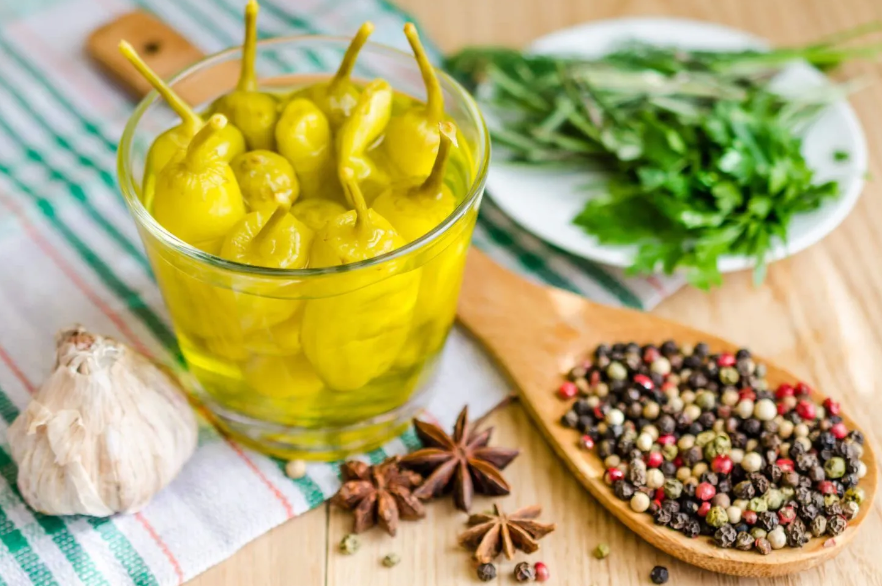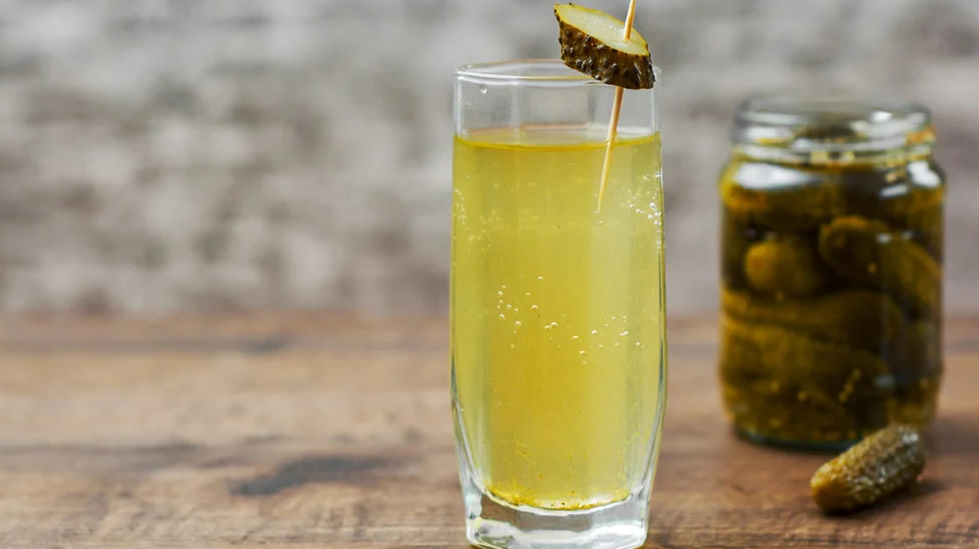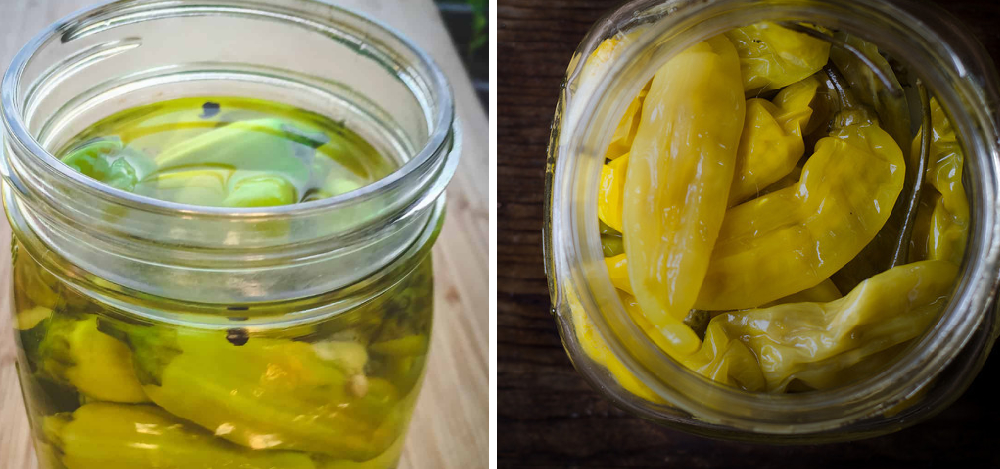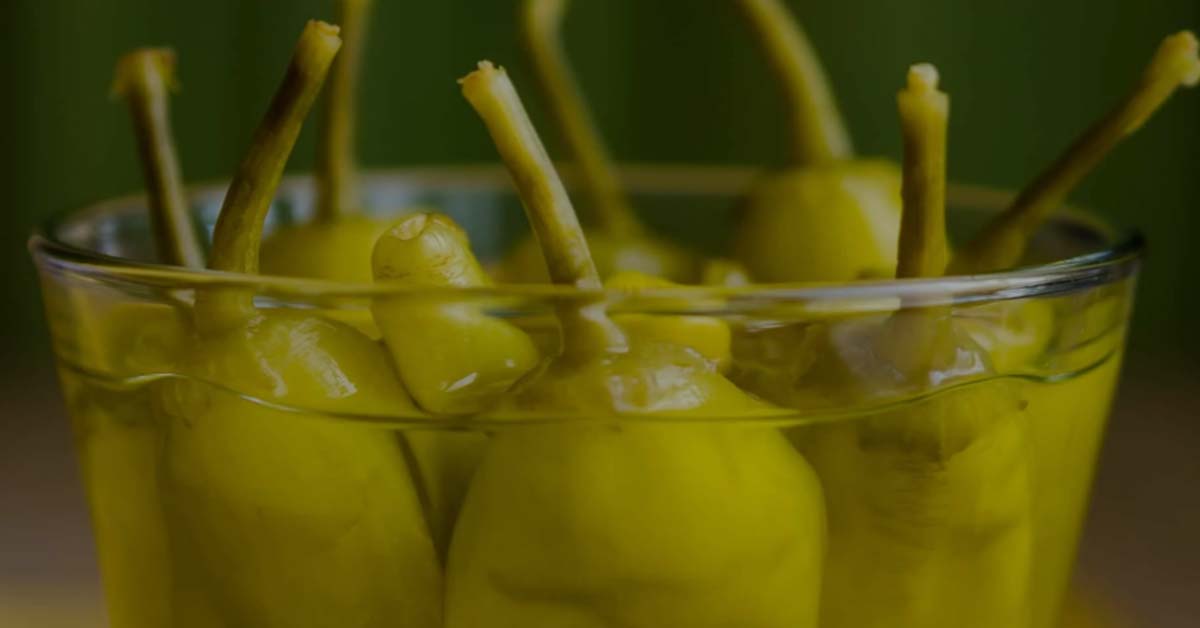Approved By » Esther Howard (Nutritionist) & Dr. Jane Cooper (Expert Dietitian)
In recent years, we’ve seen a surge in popularity for various “miracle” juices – from tart cherry juice to tangy pickle juice. These elixirs are often touted for their purported health benefits, from muscle cramp relief to improved digestion.
But what about another zesty contender – pepperoncini juice? These bright green, pickled peppers are a staple in many Mediterranean dishes, but is drinking pepperoncini juice good for you?
The Short Answer
Drinking pepperoncini juice in moderation may offer some potential benefits like electrolyte replenishment and digestive support.
However, the high sodium content can be a concern, especially for those with hypertension or other health conditions requiring sodium restrictions.
Moderation and consulting a healthcare provider are advised.
In this article, we’re going to take a deep dive into the world of pepperoncini juice.
We’ll explore its nutritional profile, potential health benefits, and potential downsides to help you decide if this spicy sipper is worth adding to your wellness routine.
By the end, you’ll better understand whether drinking pepperoncini juice is truly good for you or best left as a tasty condiment.
Nutritional Breakdown of Pepperoncini Juice
Before we can determine the health merits of pepperoncini juice, it’s important to understand what’s actually in the stuff.
The main ingredients in pepperoncini brine are, unsurprisingly, vinegar, water, salt, and various spices used for pickling.

From a nutritional standpoint, pepperoncini juice packs a decent punch of key vitamins, minerals, and electrolytes. One cup of the juice contains approximately:
- 400-500mg of sodium
- 200-300mg of potassium
- Small amounts of vitamins A, C, and beta-carotene (antioxidants)
- A modest amount of dietary fiber
The exact nutrient profile can vary greatly depending on the brand and pickling process used. Some may contain additional seasonings or ingredients that impact the overall nutritional value.
But in general, pepperoncini juice provides a solid influx of electrolytes, with a smattering of other beneficial compounds.
Potential Health Benefits of Pepperoncini Juice
Now, let’s explore some of the potential health perks of incorporating pepperoncini juice into your routine:
Muscle Cramp Relief
One of the most intriguing proposed benefits of pepperoncini juice is its ability to alleviate muscle cramps. The theory behind this is that the vinegar content triggers a reflex that helps stop the cramping.
While the research on this is limited, some studies have found pickle juice (which shares a similar vinegar profile) to be modestly effective at relieving exercise-induced muscle cramps.
Since pepperoncini juice also contains a solid amount of electrolytes like sodium and potassium, it’s plausible that it could help replenish what’s lost through sweating and contribute to muscle function.

Of course, more research is needed to confirm this effect, but if you’re an active individual who struggles with pesky cramps, it may be worth trying a diluted shot of pepperoncini juice as an experiment.
Hydration and Electrolyte Replenishment
Speaking of electrolytes, pepperoncini juice’s high sodium and potassium content make it a potentially useful beverage for rehydrating and replenishing these crucial minerals.
This could be especially beneficial for athletes, outdoor enthusiasts, or anyone who tends to lose a lot of electrolytes through sweat.
While plain water is still generally the best choice for everyday hydration, a splash of pepperoncini juice diluted in water may provide a helpful electrolyte boost, particularly if you’re engaging in prolonged physical activity in hot, humid conditions.
Is the Detox Island Green Smoothie Good for You?
Gut Health Support
The acidity and fermentation process that creates pepperoncini juice may also offer some gut health benefits.
The vinegar content can help stimulate digestive juices, aiding in the breakdown of food.
And the naturally occurring probiotics from the fermentation could help balance gut bacteria levels.
Additionally, the small amount of dietary fiber in pepperoncini juice may contribute to regular bowel movements and overall digestive regularity.
Of course, these benefits are relatively minor compared to consuming whole pepperoncini, but the juice could provide a modest assist to your gut.
Blood Sugar Regulation
Some research has suggested that the acetic acid found in vinegar-based products like pepperoncini juice may help improve insulin sensitivity and moderate blood sugar spikes.

However, the evidence on this is mixed, and more studies are needed to confirm the extent of these potential benefits.
If you have diabetes or are concerned about blood sugar control, chatting with your healthcare provider about responsibly incorporating pepperoncini juice into your routine could be worth exploring.
Is Chocolate Almond Milk Good for You?
Downsides of Drinking Pepperoncini Juice
While pepperoncini juice does offer some intriguing potential health perks, there are a few important downsides to be aware of:
High Sodium Content
The most significant concern with pepperoncini juice is its high sodium content, which can range from 400-500mg per cup.
For individuals with high blood pressure, heart disease, or kidney issues, this level of sodium intake could be problematic and potentially exacerbate their condition.
Moderation is key when it comes to pepperoncini juice, and it’s best to consult a healthcare provider before making it a regular part of your diet, especially if you have any existing health conditions that require sodium monitoring.
Limited Nutritional Value
While pepperoncini juice does provide some vitamins, minerals, and antioxidants, it pales in comparison to the comprehensive nutritional profile of whole peppers.

The fiber, vitamins, and minerals found in the actual pepperoncini are much more abundant than what’s present in the juice alone.
So, while the juice can offer some beneficial compounds, it shouldn’t be viewed as a nutritional powerhouse or a replacement for a balanced, whole-food-focused diet.
Taste and Acidity Concerns
The bold, tangy flavor of pepperoncini juice isn’t for everyone, and the high acidity can potentially irritate sensitive stomachs or exacerbate conditions like acid reflux.
If you have a history of digestive issues, it’s best to proceed with caution and monitor how your body responds.
Is Clamato Juice Good for You?
Who Should Avoid Pepperoncini Juice?
Given the potential downsides, there are a few groups of people who may want to steer clear of drinking pepperoncini juice regularly:
- Individuals with high blood pressure or on sodium-restricted diets: The high sodium content could be problematic for managing these conditions.
- People with sensitive stomachs or acid reflux: The acidity of the juice may trigger or worsen digestive discomfort.
- Children: The spicy, acidic nature of pepperoncini juice may not be well-suited for young developing digestive systems.
Are Sqwinchers Zero Good for You?
Safer Alternatives to Consider
If you’re looking to reap some of the potential benefits of pepperoncini juice without the potential drawbacks, here are a few safer alternatives to consider:
Eating Whole Pepperoncini Peppers
Consuming the whole pepperoncini, rather than just the juice, provides a more comprehensive nutritional profile with additional fiber, vitamins, and minerals. This can be a more balanced way to enjoy the flavors.
Low-Sodium Pickle Juice
If you’re attracted to the vinegary, electrolyte-rich profile of pepperoncini juice, you could try a low-sodium pickle juice instead. This can deliver similar potential benefits with less sodium.
Electrolyte-Infused Water
Opt for water infused with electrolyte-rich fruits, vegetables, or powders for general hydration and electrolyte replenishment. This provides the minerals without the excess sodium.
Check out this: Is Jumex Good for You?
Is Drinking Pepperoncini Juice Good for You?
The answer is a bit complicated. While pepperoncini juice does offer some potentially beneficial nutrients and compounds, the high sodium content is a significant concern, especially for those with certain health conditions.
Ultimately, I would recommend approaching pepperoncini juice with moderation and caution. Enjoy it occasionally as a flavoring in recipes or even the occasional cocktail, but don’t view it as a health tonic to be consumed in large quantities.
Focus instead on eating the whole pepperoncini peppers, which provide a more comprehensive nutritional profile.
As always, if you have any underlying health issues or are unsure about incorporating pepperoncini juice into your routine, be sure to consult with your healthcare provider first.
They can provide personalized guidance on whether pepperoncini juice is a good fit for your individual needs and wellness goals.

